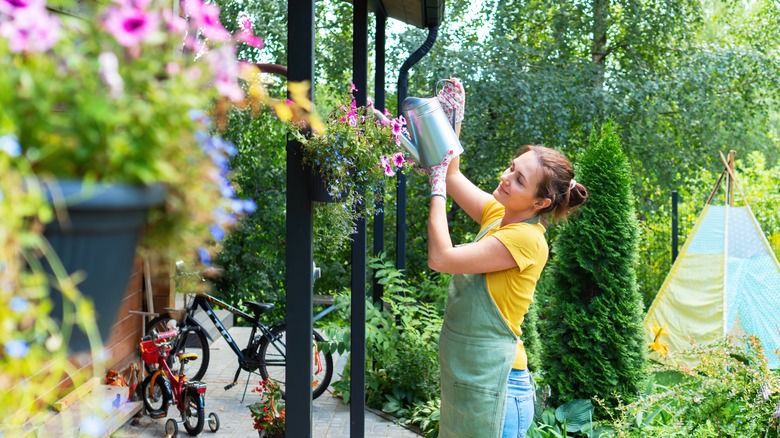Our Professional Gardener On How Often To Water Summer Annuals To Keep Them Thriving
Planting annuals is a yearly ritual for many gardeners. Whether in containers or planted in flower beds, many flowering annuals are relatively care-free. But they do sometimes need a bit of extra water to keep them looking fresh and colorful, and it's probably more often than you think. Throughout the growing season, watering annuals once per day is usually sufficient.
Annuals are desirable in the garden because they bloom for weeks, sometimes all summer long, as compared to perennials that usually bloom for much briefer periods. Annual flowers often come from very warm climates, and so they often need ample water to keep them looking fresh and producing blooms. Some annuals need more water than others: plants with succulent qualities, such as portulacas, don't tend to require as much water as other tender annuals, like petunias.
Factors that affect how often you need to water your annuals include the size of the container (or whether they're planted in containers or beds), the type of soil they're growing in, how drought-tolerant the plants are, how much sun they're getting, and how high the temperatures are during the day. It's important to keep your annuals watered well during very hot, dry weather, possibly even twice a day.
Container annuals versus annuals planted in beds
Growing annuals sometimes seems like an "easy" way to garden, but the truth is they need frequent care to stay vibrant. Frequent or even daily watering is one of the main aspects of care needed by annual flowers, to keep them blooming all season long. How often you water can vary depending on where your annual flowers are planted. If you have shade-loving annuals like strawberry begonias or impatiens, they may need water less frequently than sun-loving annuals.
Annuals in containers may need watering more often than annuals planted in your flower beds. This is simply due to the amount of soil being smaller, and prone to drying out much quicker. Some types of materials dry out faster than others, also: for example, terracotta pots usually maintain moisture a bit longer than glazed ceramic or plastic. Hanging baskets often use permeable materials such as coir or burlap, which sometimes means that annuals growing in these containers will need watering more often.
You may find that annuals in your flowers beds dry out a bit faster than other perennials that are established. This is because your perennials may have larger root system that help conserve moisture. Look at your annuals and see if they're wilting or drooping; if so, this may mean they need a bit of extra water. The best time to water them is in the early morning or just before sundown.
Avoid overwatering
While frequent watering is usually the standard for annual flowers, it's possible to overwater them, and this should be avoided. Overwatering can cause root rot, or cause leaves to turn yellow, and may even kill your flowers. One good way to avoid overwatering your annuals is to keep an eye on the weather forecast. Gentle rain is fine for potted annuals. But if they're in danger of getting soaked by heavy rain, consider protecting them (or moving them, if possible).
If your annuals are in containers, having a dish or saucer under the pot can help with drainage. If the saucer is full after rainfall, gently tip it so the water runs out, or bail it out with a spoon. You can check to see if your container plants are retaining too much water by touching the soil, much as you check the soil moisture for houseplants to avoid overwatering them. If the top inch of soil is soggy to the touch, the plant is waterlogged. Let the soil dry out thoroughly before watering again.
As the season progresses you will start to get an idea of how much to water your annual flowers based on how they look, and also how they respond to watering. You may need to increase water in extremely hot weather, but water isn't the only solution to soothing an overheated plant. You can also try giving your plant some shade to see if that helps it to perk up a bit.


